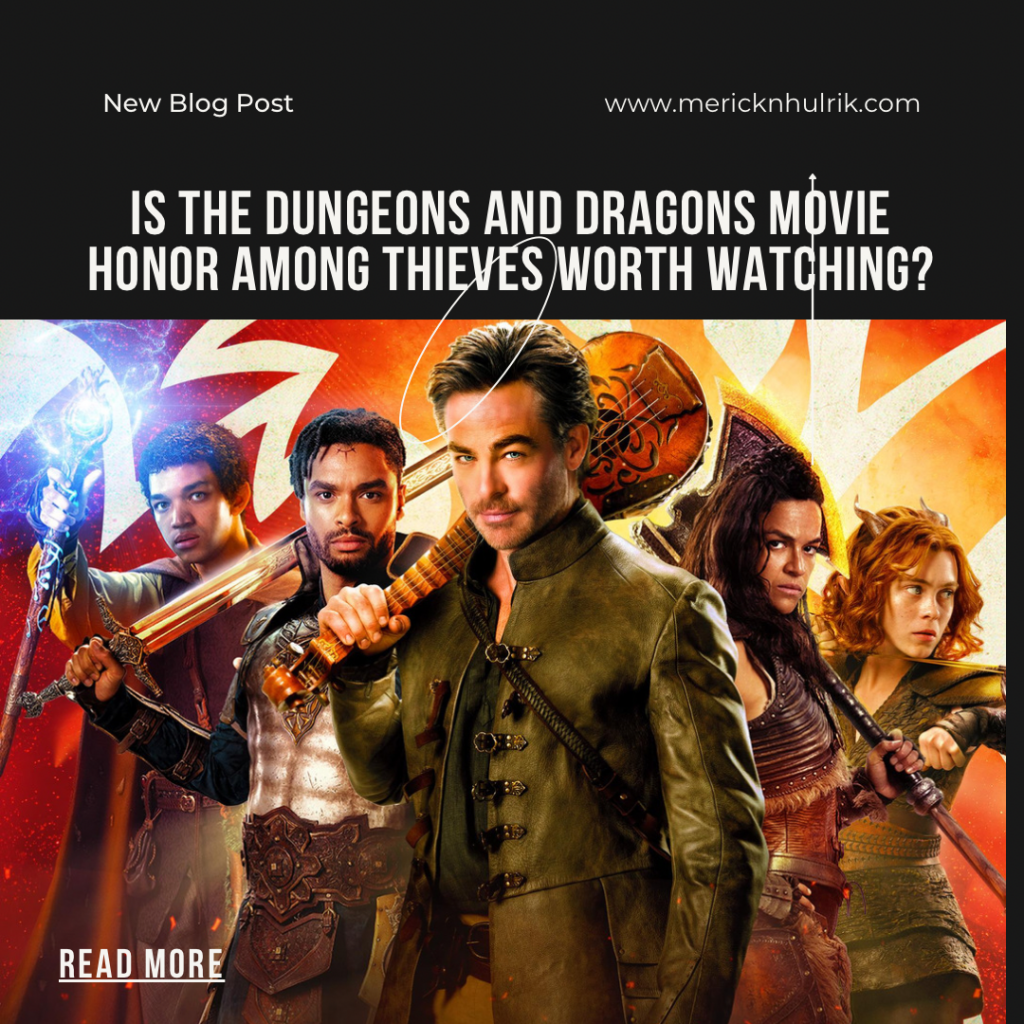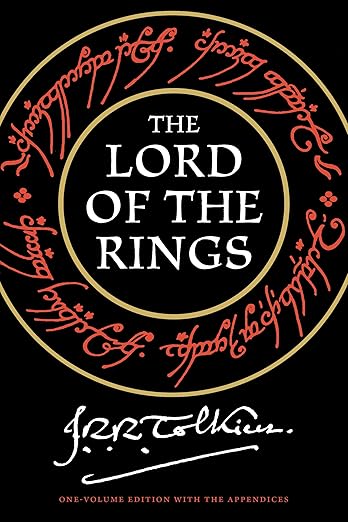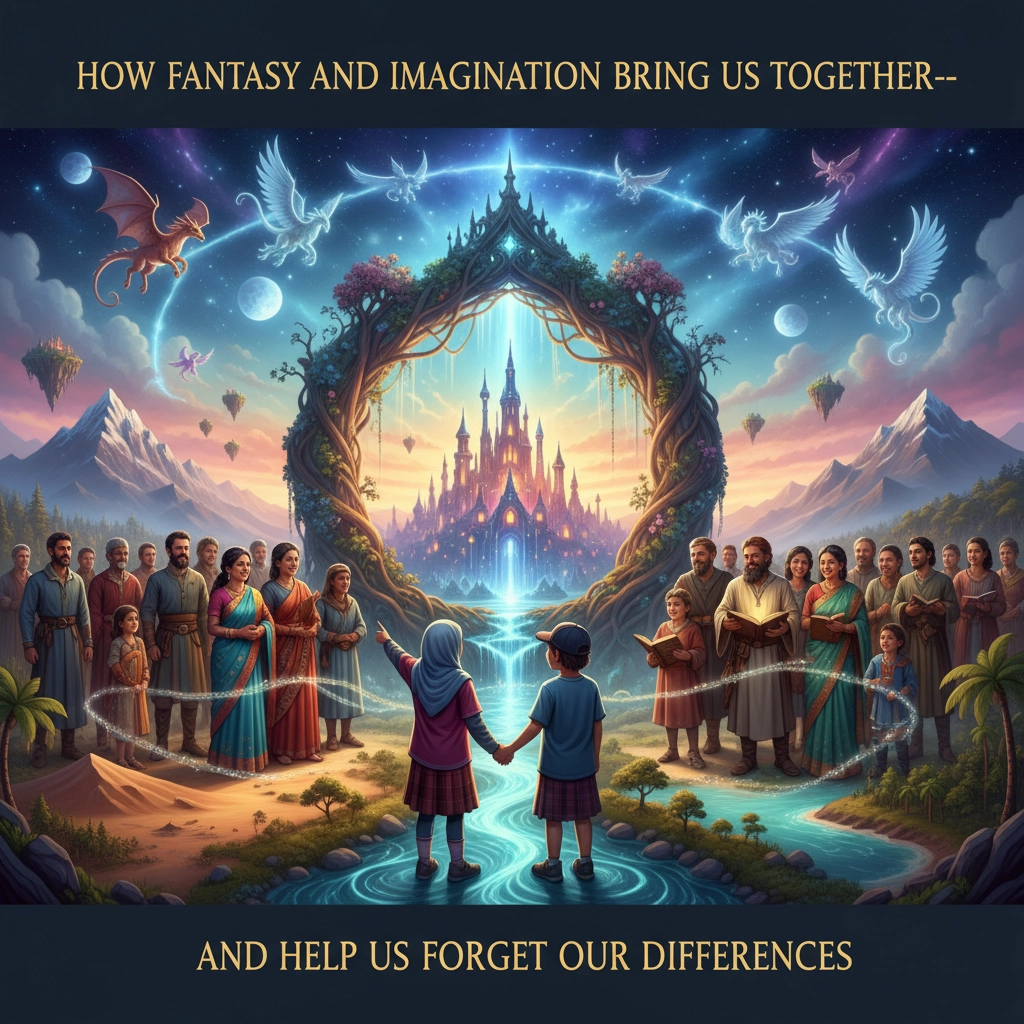
How Fantasy and Imagination Bring Us Together: and Help Us Forget Our Differences, In a world increasingly divided by politics, culture, and belief systems, there exists a powerful force that transcends these boundaries and unites us in our shared humanity: the realm of fantasy and imagination. Far from being mere escapism, fantasy literature serves as a bridge between souls, creating common ground where differences dissolve and connections flourish.
When we open a fantasy novel, we’re not just reading: we’re participating in an ancient human tradition of storytelling that has bound communities together for millennia. The dragons we fear, the heroes we root for, and the magical worlds we explore become shared experiences that unite readers across continents, cultures, and generations.
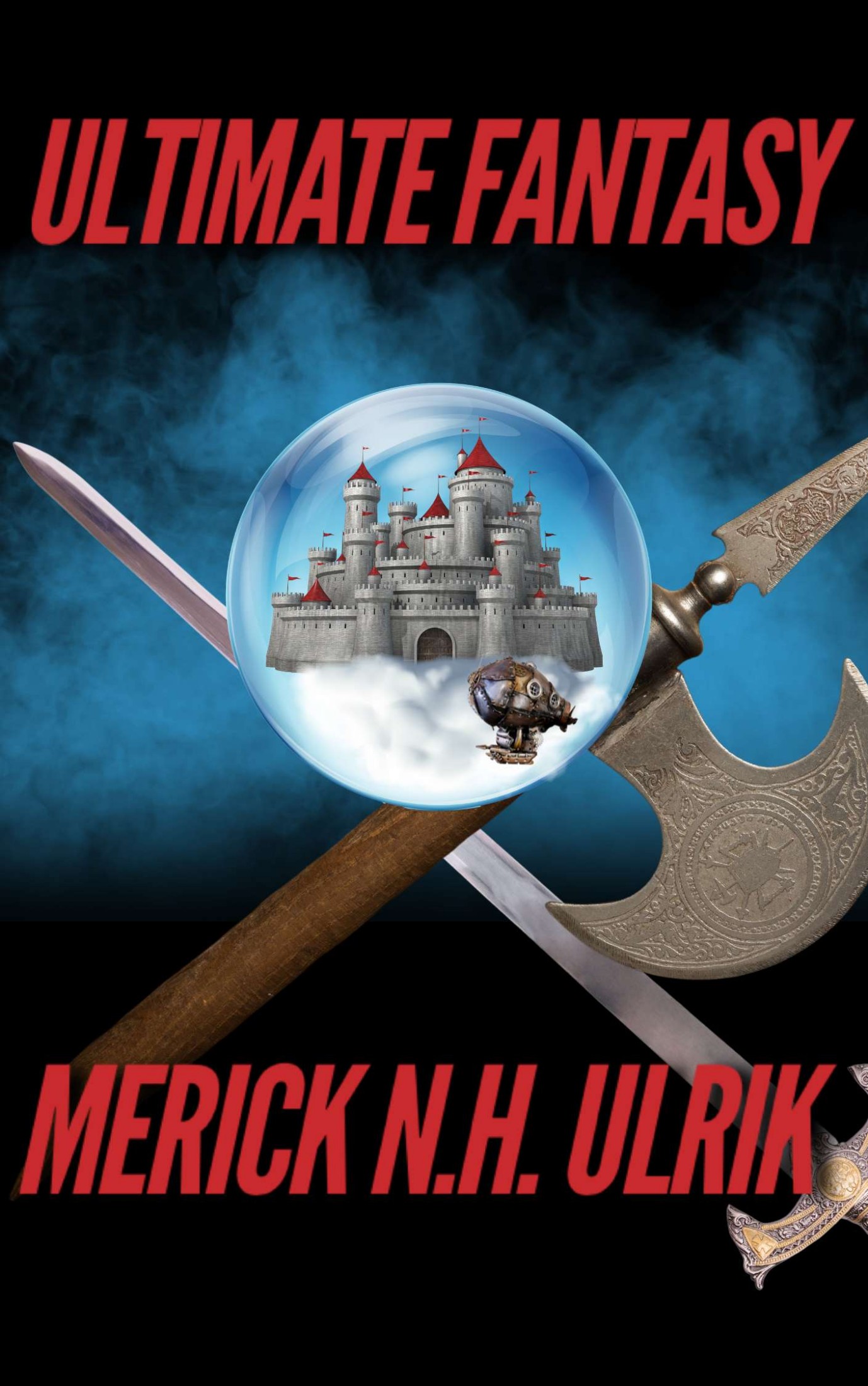
The Universal Language of Wonder
Fantasy speaks a universal language that needs no translation. A child in Tokyo reading about a young wizard’s journey understands the same courage, friendship, and sacrifice as a teenager in São Paulo or an adult in Stockholm. These stories tap into archetypal emotions and experiences that exist within every human heart, regardless of background or circumstance.
Consider how fantasy literature consistently explores themes that resonate across all cultures: the struggle between good and evil, the hero’s journey from innocence to wisdom, the power of friendship in overcoming adversity, and the triumph of hope over despair. These aren’t just Western concepts or Eastern philosophies: they’re human experiences that every person can recognize and connect with.
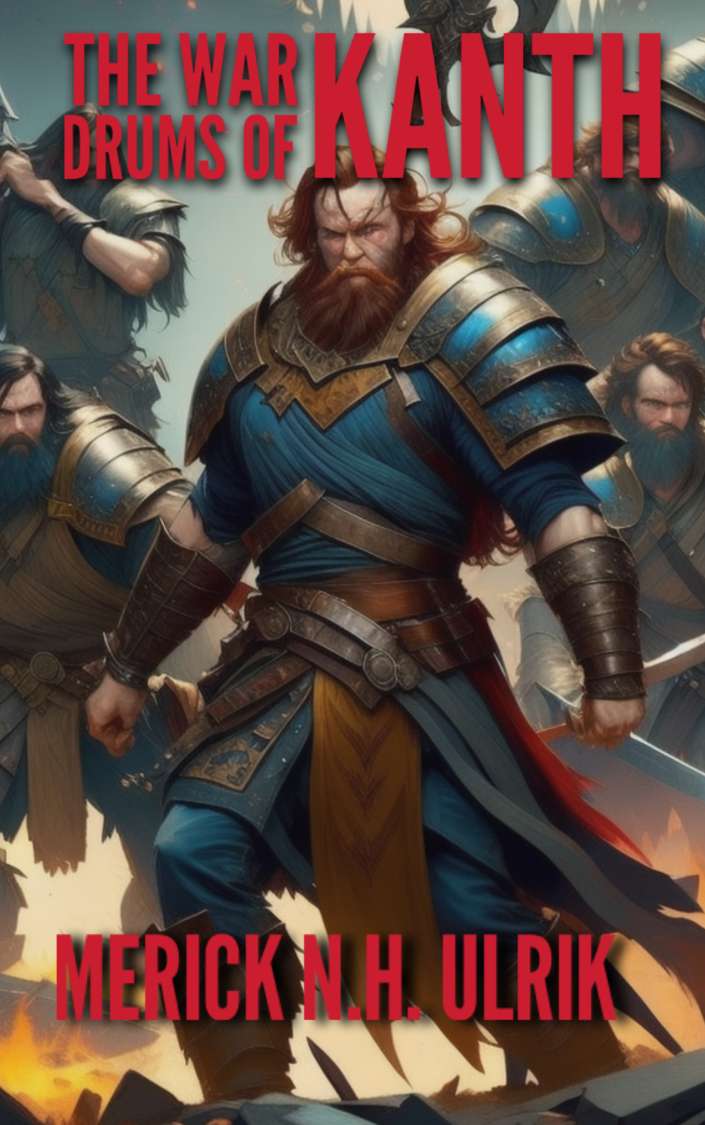
The power of fantasy lies in its ability to strip away the superficial differences that divide us and focus on the core experiences that unite us. When we read about warriors facing impossible odds or ordinary people discovering extraordinary strength, we’re not thinking about the reader’s nationality, religion, or social status: we’re thinking about the universal human capacity for courage, growth, and transformation.
Shared Worlds, Shared Dreams
One of the most remarkable aspects of fantasy literature is how it creates shared imaginary spaces where people from vastly different backgrounds can meet as equals. Online forums, book clubs, and fan communities dedicated to fantasy series become melting pots of diversity, where a retired teacher from rural America might engage in passionate discussions about character development with a college student from urban India, finding common ground in their shared love for the story.
These shared fictional worlds become safe spaces for exploring difficult topics. Through the metaphor of fantasy, we can discuss prejudice through the lens of different magical races, examine social inequality through class systems in imaginary kingdoms, and explore the consequences of war through epic battles between forces of light and darkness. The fantasy setting provides enough distance from real-world tensions to allow for honest dialogue while still addressing the same fundamental issues.
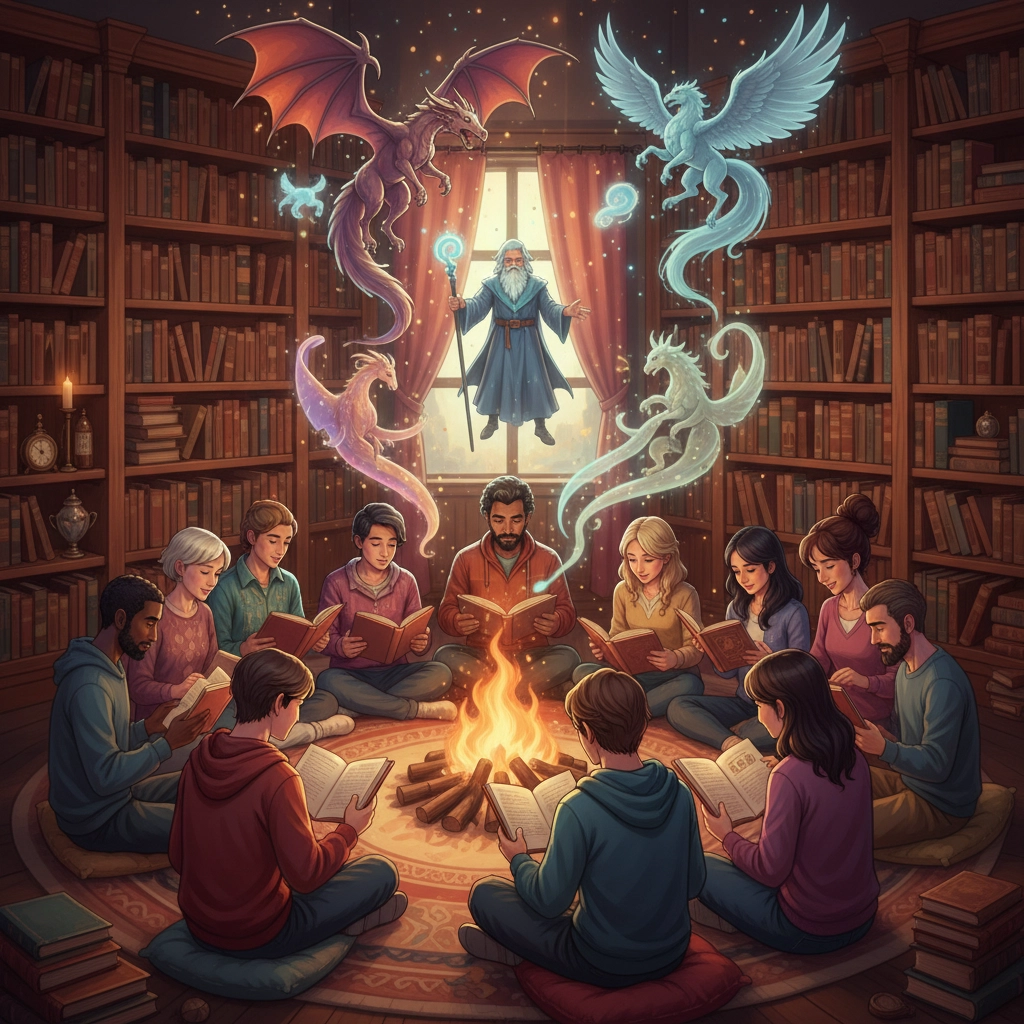
Fantasy conventions and gatherings demonstrate this unifying power in the physical world. People of all ages, backgrounds, and walks of life come together, often in costume, celebrating their shared passion for imaginative worlds. In these spaces, social barriers dissolve as a CEO might enthusiastically discuss dragon lore with a barista, both equally invested in the fictional universe they love.
The Empathy Engine
Fantasy literature serves as what researchers call an “empathy engine,” training our emotional muscles through exposure to diverse perspectives and experiences. When we read about characters from different fantasy races, cultures, or magical systems, we’re practicing the mental flexibility needed to understand and accept real-world diversity.
Studies show that adults who engaged in fantasy play during childhood exhibit higher levels of empathy, emotional intelligence, and prosocial behavior. This isn’t coincidental: fantasy naturally requires us to step outside our own perspective and imagine what it would be like to be someone fundamentally different from ourselves. Whether it’s understanding the alien thought processes of an elf, the earthbound wisdom of a dwarf, or the fierce loyalty of a dragon rider, fantasy expands our capacity for understanding otherness.
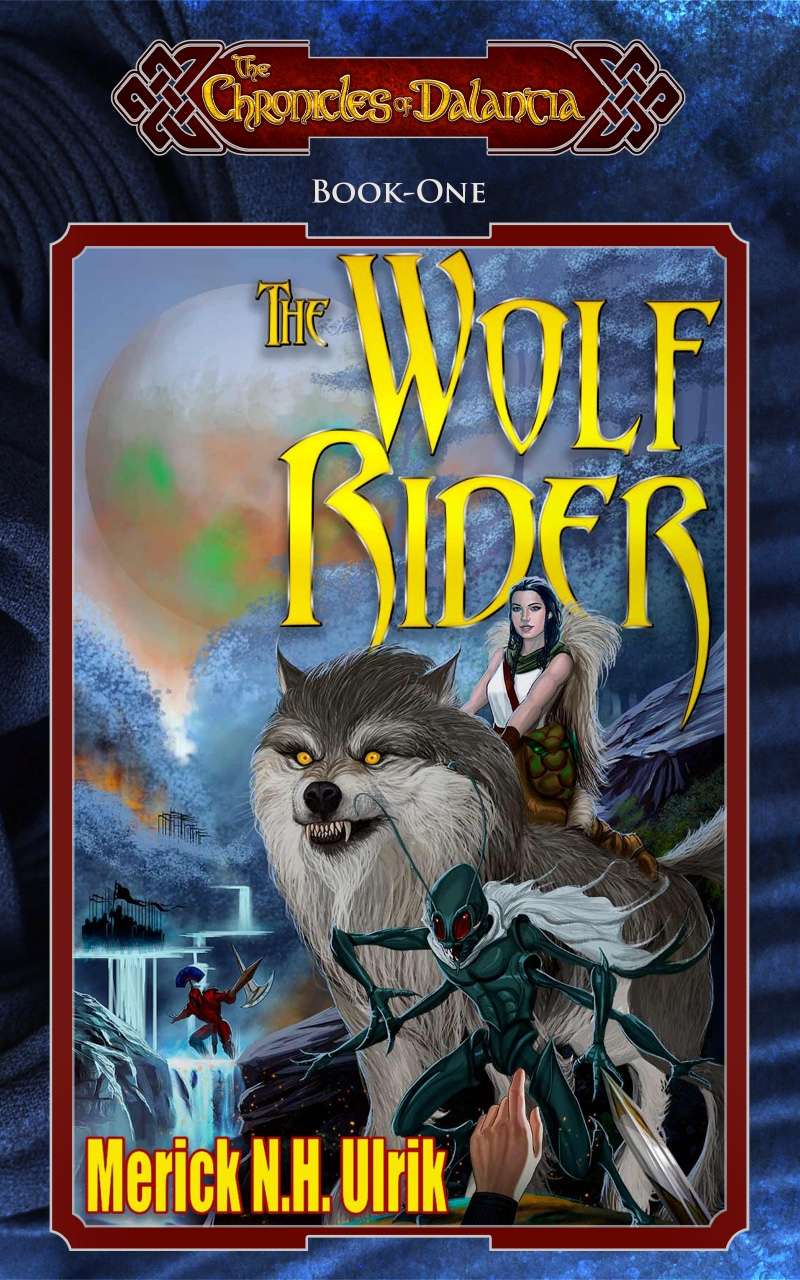
This empathy training extends beyond the pages of books. Readers who regularly engage with fantasy literature often show increased tolerance for ambiguity, greater creativity in problem-solving, and enhanced ability to see multiple sides of complex issues. They’ve practiced navigating moral gray areas through fantasy storylines and learned that heroes and villains aren’t always clearly defined: skills that prove invaluable in real-world relationships and conflicts.
Healing Through Shared Imagination
Fantasy provides a unique form of emotional healing that brings people together through shared catharsis. When we read about characters overcoming trauma, loss, or seemingly impossible challenges, we’re not just being entertained: we’re processing our own struggles through a safe, imaginative framework.
Book clubs and reading communities often become support networks where people share how certain fantasy stories helped them through difficult times. A reader dealing with grief might find solace in a story about necromancers learning to let go of the dead, while someone struggling with identity issues might connect with a shape-shifter’s journey toward self-acceptance. These shared healing experiences create bonds between strangers who might otherwise never have connected.
The therapeutic power of fantasy extends to its ability to help us envision better futures. In a world often dominated by negative news and divisive rhetoric, fantasy literature offers hope by showing us worlds where good can triumph, where unlikely alliances form, and where individuals can make a meaningful difference. This shared optimism becomes a foundation for real-world collaboration and positive change.
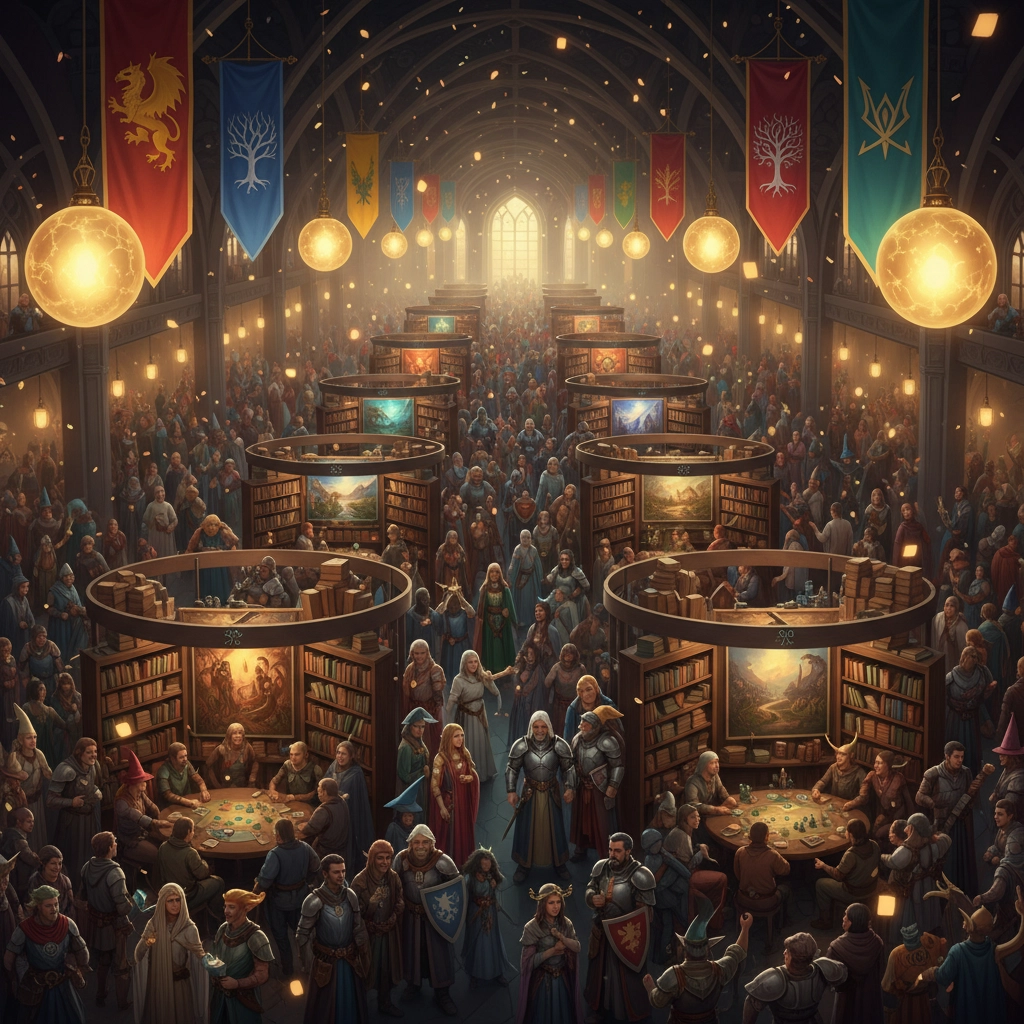
Breaking Down Cultural Barriers
Fantasy literature has a unique ability to address cultural differences without the baggage of real-world history and prejudice. When an author creates a fantasy world with different races or cultures, they can explore themes of discrimination, integration, and understanding without triggering the defensive reactions that often accompany discussions of real-world racial or cultural issues.
Readers from different backgrounds can more easily examine their own biases when they’re reflected through fantasy mirrors. A person who might resist discussions about immigration policy could find themselves deeply moved by a story about refugees from a magical realm seeking shelter in a foreign kingdom. The fantasy setting provides enough emotional distance to allow for genuine reflection and growth.
Moreover, fantasy authors increasingly draw inspiration from diverse mythologies, folklore, and cultural traditions, introducing readers to belief systems and worldviews they might never otherwise encounter. A fantasy novel inspired by West African mythology exposes readers worldwide to different concepts of spirituality, community, and heroism, fostering cross-cultural understanding through engaging storytelling.
The Role-Playing Revolution
Fantasy role-playing games represent perhaps the most interactive form of imaginative community-building. When players gather around a table (or connect online) to create collaborative stories, they’re engaging in a form of group improvisation that requires constant cooperation, negotiation, and mutual respect. Players must coordinate their individual character goals with group objectives, learning to value different perspectives and approaches to problem-solving.
The diversity found in fantasy role-playing groups would be remarkable in any other context. Players regularly transcend age gaps, socioeconomic differences, and cultural backgrounds to work together toward shared narrative goals. A group might include a high school student, a retiree, a recent immigrant, and a single parent, all united by their desire to tell an engaging story together.
These gaming communities often become some of the most inclusive spaces people experience, where judgment is suspended in favor of creativity and mutual support. The fantasy setting allows players to experiment with different aspects of their personalities, try on different worldviews, and practice social skills in a low-stakes environment.

Digital Realms, Global Connections
The internet has exponentially amplified fantasy’s power to bring people together. Online multiplayer fantasy games connect millions of players worldwide, creating virtual communities that often become more meaningful than many real-world relationships. Players collaborate on epic quests, support each other through challenging gameplay, and form lasting friendships that transcend geographic boundaries.
Fan fiction communities represent another powerful example of fantasy’s unifying force. Writers and readers from around the globe collaborate to expand beloved fantasy universes, sharing their interpretations and adding their own cultural perspectives to existing worlds. These communities are remarkably supportive and inclusive, with established writers mentoring newcomers regardless of their background or experience level.
Social media platforms dedicated to fantasy literature buzz with discussions, recommendations, and artistic creations that bring together people who might never interact otherwise. A fantasy book recommendation from someone in New Zealand might lead to a lifelong friendship with a reader in Norway, connected by their shared love of magical worlds and epic adventures.
The Future of Imaginative Unity
As our world faces increasing polarization and division, fantasy literature and imaginative storytelling become more important than ever. These stories remind us of our shared humanity, our common dreams and fears, and our collective potential for growth and heroism. They provide safe spaces for difficult conversations, training grounds for empathy, and inspiration for building better real-world communities.
The Genres Continue to Evolve.
The fantasy genres continue to evolve, embracing diverse voices and perspectives that ensure these unifying stories remain relevant and inclusive. New authors bring fresh cultural viewpoints, different mythological traditions, and innovative approaches to classic themes, ensuring that fantasy remains a bridge-building force for future generations.
In our divided world, fantasy and imagination offer something precious: the ability to dream together. When we share these dreams: whether through reading the same books, playing the same games, or participating in the same fandoms: we create connections that transcend the differences that might otherwise divide us.
Fantasy doesn’t make us forget our differences by erasing them, but by helping us see that what unites us as human beings is far more powerful than what divides us. In magical worlds filled with impossible creatures and epic adventures, we discover the most important truth of all: we’re all in this story together.
